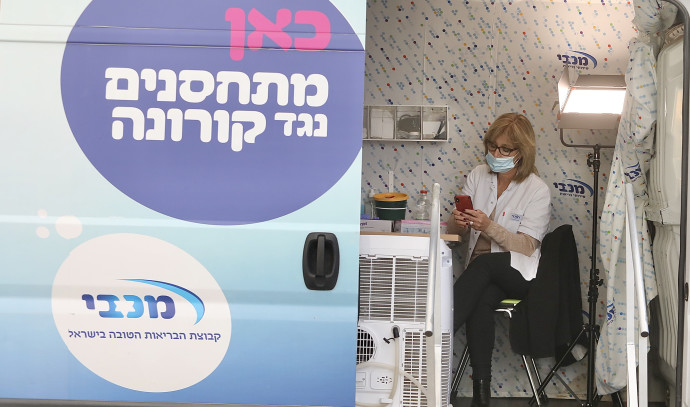The first phase of the Corona vaccination campaign will officially open this coming Sunday, December 20, with the transfer of vaccines to about ten hospitals and HMO vaccination centers, for the benefit of vaccinating medical teams in HMOs and hospitals, with the vaccine gradually reaching all vaccine sites over the next few days.
Ahead of the deadline, the Ministry of Health has published its recommendations regarding the prioritization of vaccines for Corona – who will receive first and when. According to the Corona Vaccines Committee’s recommendation document, the first priority will be medical staff, Magen Avot institutions and those aged 60 and over. Second priority – risk groups, high-exposure groups such as education and welfare teams, the IDF and security bodies – and later the entire population will be able to receive the vaccine through the health funds.
According to the document, the priority is affected by logistical constraints and the limitation of the immunization ability of the teams at the vaccination sites. The operation will be graded and the timing will try to maximize safety, health and efficiency. Internal priority within priority groups may vary. The warehouse crews will exercise discretion and flexibility to advance the success of the operation.
in first priority:
Medical staff – hospitals, health funds and private clinics; Geriatric and psychiatric hospitals; Nursing and medical students in clinical rounds and MDA and other rescue organizations.
Magen Avot institutions and welfare institutions for caregivers and their caregivers.
People aged 60 and over – under the auspices of the HMOs. The document states that as part of the vaccine at the health insurance funds, it is necessary to act flexibly and vaccinate the elderly in the community, caregivers and caregivers, as well as populations at special risk, such as lung transplants.
- Are you afraid of the vaccine for Corona? These are the things you must know Click for details
Second priority:
Risk groups: diabetes, morbid obesity, COPD, hypertension, patients with immunosuppression – organ transplants, hematologic patients, etc. The document states that in the group of patients with immunosuppression, vaccination should also be included for the family members and family members of these patients with the same priority.
High-exposure groups: education and welfare teams, prisons and wardens, first responders.
IDF and security bodies: will receive an allocation in accordance with the vaccination plan that will be presented to the Ministry of Health
Below: Opening the vaccine to the entire population through the HMOs according to the arrival of the vaccines and the schedule of the HMOs.
Will not be vaccinated at this time:
Recovering, people with a history of severe overreactions – anaphylaxis, pregnant women, lactating women, women planning to become pregnant, children and adolescents up to 16 years.
Meanwhile, the Chief of Staff Kochavi Spring Discount to promote the vaccination of IDF soldiers quickly and efficiently. After two discussions, Kochavi discounted his deputy, Major General Eyal Zamir, To prepare for the implementation of the Corona vaccination campaign in the IDF. As stated, the entire process will be managed by the Technology and Logistics Division, led by the Medical Corps, while establishing a customized logistics envelope. The IDF Spokesman emphasized that “The purpose of the operation is to provide the Corona vaccine to all IDF soldiers, in the shortest period of time from the moment the vaccines are received, in a supervised, effective and professional manner.”.
As stated, the military operation is coordinated with the Ministry of Health, and will take place in accordance with the guidelines, while adhering to the mandatory procedures – including storage conditions, scheduling the second vaccination and defining the patient as vaccinated. The vaccines will be issued to spatial vaccination complexes to which the soldiers will be invited, when the vaccination will be given by a medical staff member, and will be done under the supervision of a qualified nurse. In addition, the Shuttle system, which was originally established as a substitute for public transportation, will be used to transport soldiers from the various units, in an organized and concentrated manner, to the vaccination complexes.
The army emphasized that the level of immunization was determined according to the priority given by the General Staff, which was instructed by the Operations Division, in cooperation with the commands, divisions and arms. “IDF servicers are expected to start getting vaccinated as early as the end of next month. Priorities for prioritization include medical personnel, who are at the forefront of the fight in the struggle, followed by IDF servicemen who belong to risk groups, combat units that operate in a unique outline, fighters, support arrays Critics and senior commanders, “the report said in a statement. The issue is also being examined whether the soldiers will be vaccinated by order.
 The first to be vaccinated in the army, Chief of Staff Aviv Kochavi (Photo: IDF Spokesman)
The first to be vaccinated in the army, Chief of Staff Aviv Kochavi (Photo: IDF Spokesman)Also reported: “The Chief of the General Staff will be the first to get vaccinated to set a personal example and encourage other IDF soldiers to get vaccinated.. At a later stage, upon receipt of additional vaccine doses, the remaining servants will be vaccinated. “The health of IDF servicemen and the functional continuity of the army are a supreme value in determining this priority.”
MK Moshe Arbel Sent after the publication of the priority, a letter to the Minister of Health July EdelsteinIn the coming weeks, the non-physician hospital staff will also be given priority: “In the coming weeks, the vaccination campaign of Israeli citizens will begin with corona virus vaccines. In the competence of the entire health system. It is important that, in addition to the medical staff itself, the doctors and nurses, the auxiliary staff of the hospitals, the cleaning staff, the maintenance staff, the clerks, the staff members of the manpower companies in the hospitals and so on.. The need to vaccinate them as quickly as necessary for the medical staff itself, since their chances of being infected are high due to their workplace and their infection may impair the health system’s fitness and the functioning of hospitals and health funds. “
